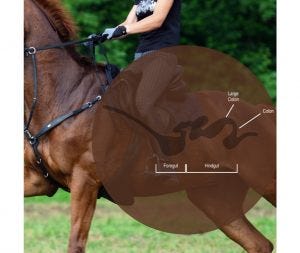We use cookies to make your experience better. To comply with the new e-Privacy directive, we need to ask for your consent to set the cookies. Learn more
3 Common causes of hindgut ulcers in horses and how to treat
What are hindgut ulcers
Hindgut or colonic ulcers, are located further down the digestive tract in the large intestine, colon or caecum of the horse.
What causes hindgut ulcers in horses?
The three most common causes of hindgut ulcers are:
- anti-inflammatories
- acidosis
- parasites
Non-steroidal anti-inflammatories
Bute and Banamine are commonly used to relieve pain and inflammation in horses. The use of NSAID's adversely affects mucous production and blood flow. As a result the development of ulcers.
Hindgut Acidosis
Hindgut acidosis is caused by large quantities of undigested grains reaching the hindgut. Once in the colon these grains produce excessive amounts of lactic acid. As a result of the acidic environment the mucous production is reduced and kills off the 'good' bacteria.
Parasite infestation in horses
Parasites attach to the horse's colon causing damage to the lining. Consequently leading to colonic ulcers.

Treatment and Prevention
To heal hindgut ulcers and prevent them reappearing should be a combination of medication and dietary management. Sucralfate is the best known medication for the treatment of hindgut ulcers. It works by forming a protective film along the hindgut. This protects the ulcers from further damage and allows them to heal.
Read More: Sucralfate for Ulcers: How it works and how to feed it
Dietary management
The easiest change to make to prevent hindgut ulcers is to minimize grain and maximize roughage. Firstly roughage provides a friendly ecosystem for 'good' bacteria in the hindgut. Secondly it stimulates mucous production.









Validate your login